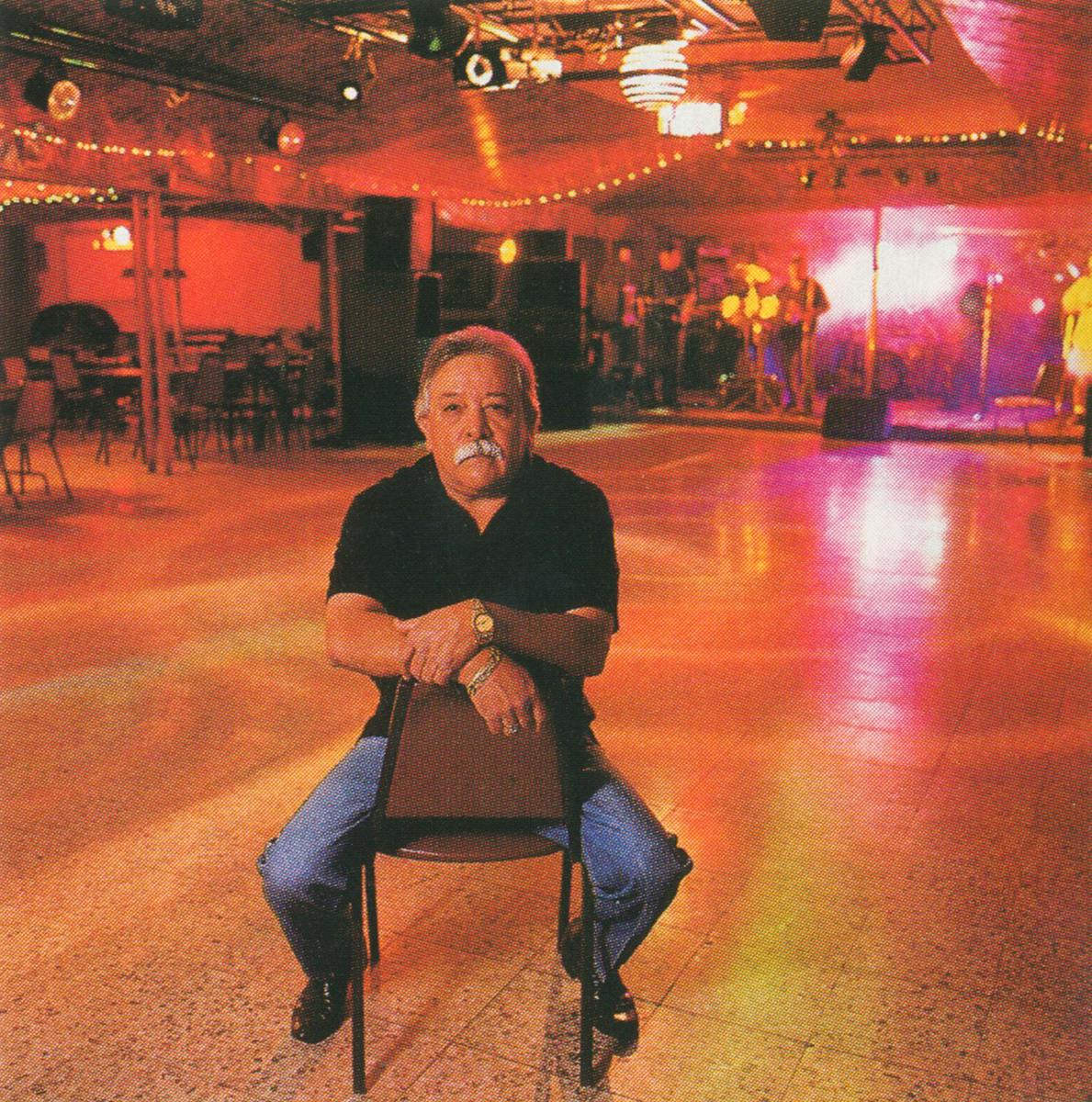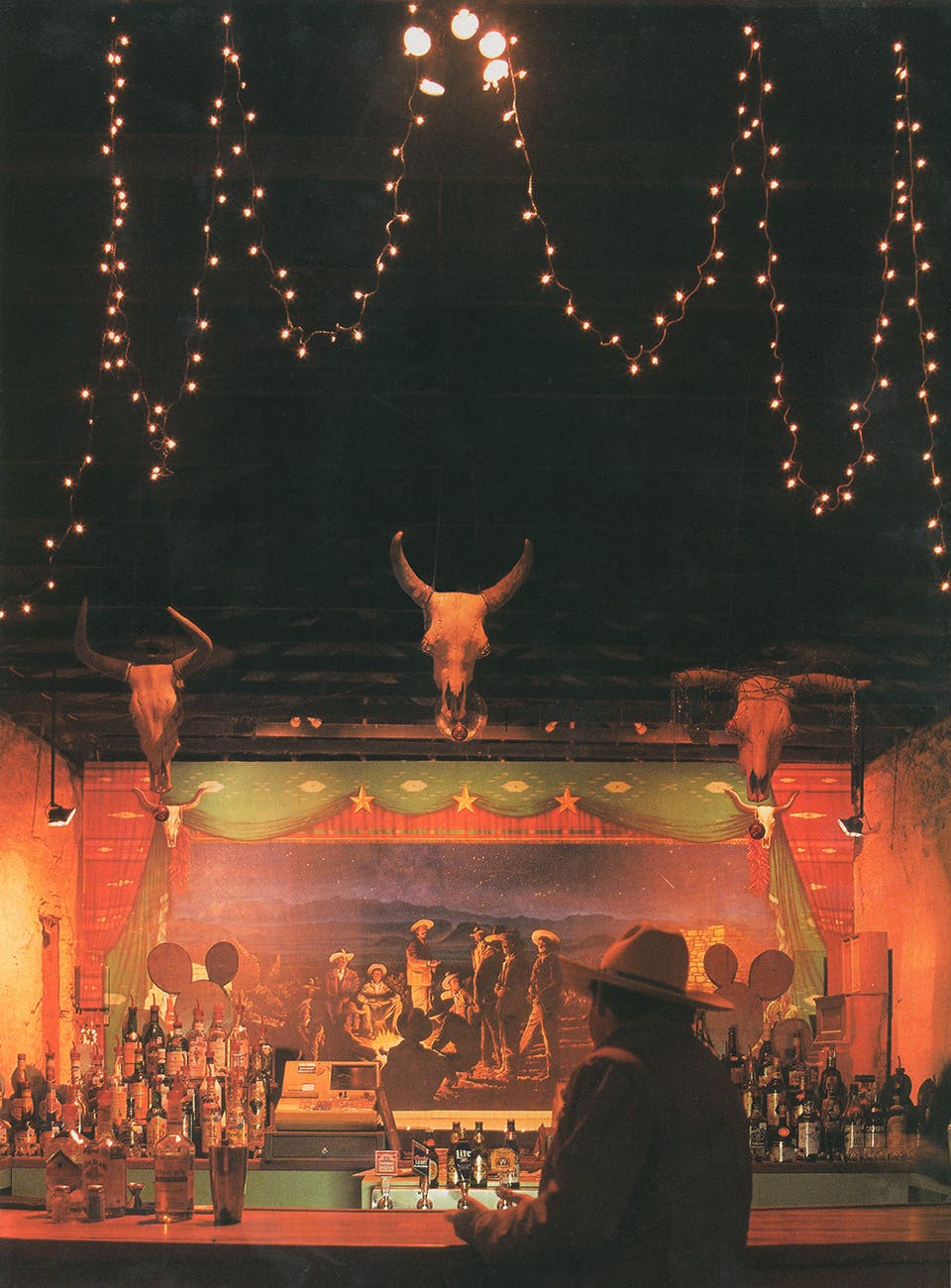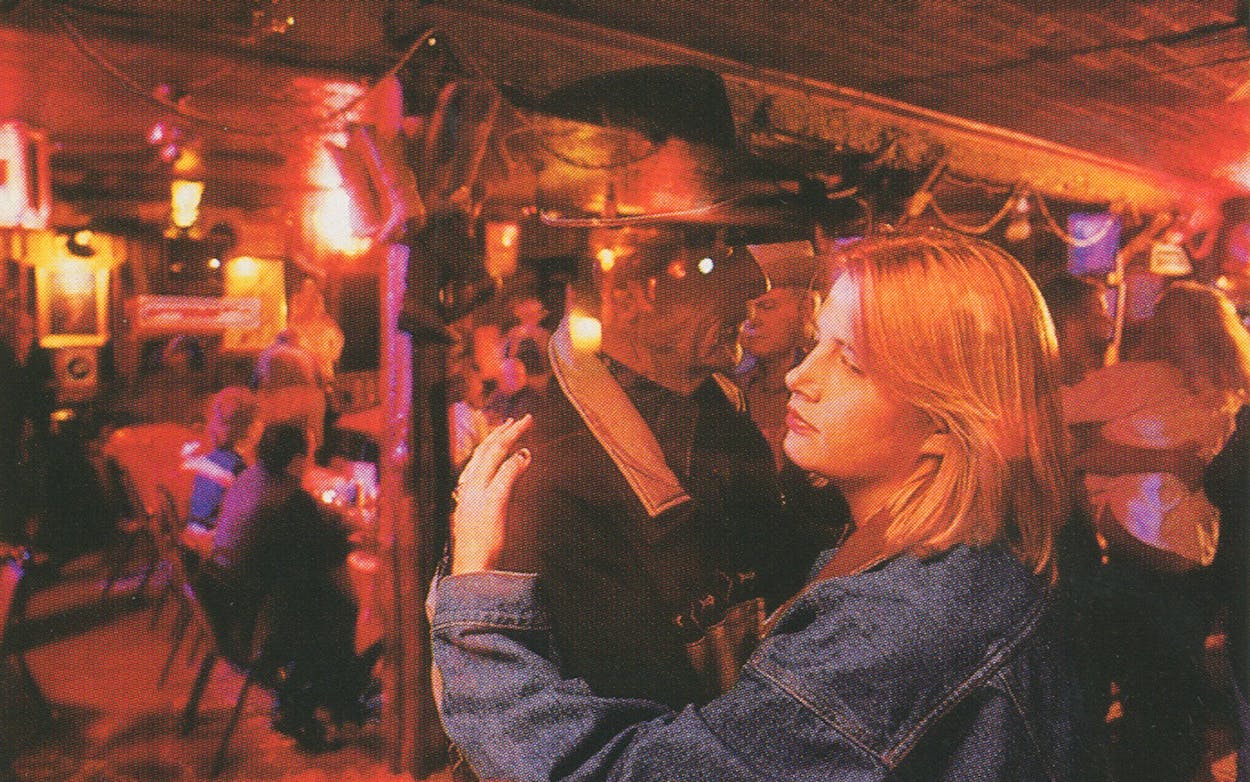Step inside a small-town live-music club in Texas and you’ll hear the sounds of the people who live there: country, blues, cajun, conjunto, polka, folk, maybe even rock and roll. The music is often played only on weekends or sometimes once a week, if that. The musicians aren’t always the best. At one roadhouse I heard the worst drummer alive, though if the crowd noticed, they didn’t say anything. At other places, you might hear something wonderful: a lost song or rhythm, a singer who never made it in the big city, an accordion player who never felt he had to try.
Most of the establishments listed below are nightclubs, bars, or honky-tonks; a few are restaurants. (We did not include dance halls, which are in a class by themselves). For all of their differences, they have one thing in common: a deep connection to their communities. They serve as places for people to gather and talk, to have a good time with others who know their name. They sit around tables in groups and couples, drinking beer—cheap and, usually, American—or cocktails created from setups bought at the bar and bottles of whiskey or gin brought from home. And, of course, they dance. The most vibrant clubs are the ones where the older folks come out to dance to the music of their youth and the young stop in out of curiosity. Most of the kids don’t stay long, but some do—maybe long enough to keep the music alive.
Step outside an urban club and you hear the clatter of the city. Step outside a small-town club and you hear things that make you feel as if you’re in a Hank Williams song: the bass rattling the thin walls, a solitary car rushing by on the lonely two-lane highway, the wind, and the slow drift of the darkness.
Arkey Blue’s Silver Dollar
Bandera
Silver Dollar is everything a honky-tonk should be. There’s a Pearl beer sign behind the bar, a Dolly Parton pinball machine, sawdust on the dance floor, and more beer signs, animal heads, and pictures of various country music and American icons, like Hank Williams, John Wayne, and Elvis, covering the walls. And then there’s Arkey Blue, whose music is all over the jukebox (twenty songs are his) and whose photos—he’s usually wearing a cowboy hat and a red bandanna—are everywhere. There’s even a carved-wood homunculus standing next to the jukebox wearing a hat and a red bandanna. Who, who is Arkey Blue? The Fredericksburg native, born Arkey Juenke, has been playing music in Central Texas for decades. In 1959 he formed the Blue Cowboys, and nine years later he bought the Silver Dollar, where he’s been playing ever since. (Other bands play there too: Dusty Britches on Wednesdays and Gary Wright and the Road Kill Band on Thursdays.) The little club, in the cellar of an old building on Bandera’s downtown strip, is generally full of locals, hunters, and in the dude-ranch season, tourists. On Fridays and Saturdays, after his band plays for a while, Arkey gets up and sings some of his songs, such as “Fast Women, Slow Horses, and Wine” and “Backstreets of Bandera.” “To write a good country song, you gotta live it,” he says. “My whole life is in my songs.” 308 Main (830-796-8826). Music: Wednesday through Saturday 9 p.m. to 1 a.m. Cover: $5.
The Trio Club
Mingus
The ghosts of Bob Wills and the Texas Playboys haunt the Trio Club, and they’re still having a good time. So are the ghosts of the thousands of North Texans who have danced there over the years. Opened in 1952, the Trio has hosted everyone from Wills to Gary Stewart, modern stars like Jody Nix, and lesser knowns like CB Sutton and Outcast and Tony Douglas and the Shrimpers. Joe and Linda May bought the hangar-shaped building in 1995 and haven’t changed a thing: country and western (old country and western), beer and setups, and a Sunday matinee. The walls are clean and barely adorned, and the booths and tables are in vintage shape. (Don’t sit at a table with a paper towel under the ashtray; that means it’s reserved. As soon as you find an unclaimed spot, the waitress will lay paper under your ashtray too: Welcome to the club.) The bands play from a cavelike room set back from the dance floor, a throwback to an era when the musicians themselves were less important than the music they played and the floor space they took up. At the Trio it’s the dance that matters, and before the first instrumental break of the first song, the floor is filled with couples eddying counterclockwise. Most have been dancing together for years. 908 S. Mingus Boulevard (254-672-5664). Music: Saturdays 9 p.m. to 1 a.m., Sundays 5 p.m. to 9:30 p.m. Cover: $5.

Mario’s
Premont
“That table, those people are from Falfurrias. That table is from Alice, and those people are from Ben Bolt”: Mario de la Garza knows everyone at his club, which is one of the few old-time conjunto nightclubs in South Texas. It was just a small cantina when he bought it in 1969 (he says he was the first Latino to own a building in Premont), but today it’s a much larger room. People come here from all over South Texas—mayors and sheriffs, migrant workers and retirees—for the traditional stuff; de la Garza prides himself on featuring old-time conjunto, whether on the jukebox or onstage. Some performers, like Mingo Saldivar, are legends; others, like Los Compadres, are hardworking dance bands. Almost all conjunto groups include an accordion, a bajo sexto guitar, bass, and drums, and at Mario’s they play to a large dance floor surrounded by tables that start emptying as soon as the accordion leads off the first song of the night. “They all come to have a good time,” de la Garza says. “It’s something they wait for every week.” U. S. 281 at the corner of Southeast First and South Broadway (512-348-9971). Music: Fridays, Saturdays, and Sundays 9 p.m. to 2 a.m. Cover: Usually none. When well-known bands play, anywhere from $3 to $6.

Starlight Theatre
Terlingua
Terlingua, seventeen miles west of the Study Butte entrance to Big Bend National Park, is as isolated as any community in Texas—or in the U.S., for that matter. The desert landscape is dotted with prehistoric rocks, hills, and trailers. The community is full of artists, writers, musicians, and assorted oddballs, many of whom came here to escape civilization. A good place to see them—onstage and in the audience—is the Starlight, an abandoned theater in a ghost town that feels like the end of the earth. Sixty years ago the big old building showed Mexican movies; today owner Angie Dean, who renovated and reopened it in 1992, serves up good food and great singer-songwriters like locals Butch Hancock and Cowboy Doug Davis and Austinites Jerry Jeff Walker and Steve Fromholz. The performers sing from a makeshift stage in a corner of the room, though when the theater holds a dance, the bands play on the old stage under the tall ceiling and the glowing blue mural of a desert campfire sing-along. It’s pure desert-rat spiritualism. Just off FM 170 (915-371-2326). Music: Thursdays, Fridays, and Sundays 7:30 p.m. to midnight; Saturdays 9 p.m. to 1 a.m. No cover.
Railroad Blues
Alpine
Alpine is not your typical small Texas town, and Railroad Blues is not your typical small-town Texas club. Both sit at 4,481 feet above sea level, for one thing, in the shadow of Big Bend’s desolate beauty. Both also defy expectations. The town is home to Sul Ross State University, the Harvard of West Texas; the club, opened in 1995 by Richard Fallon and R. C. Toler, books everything from R&B, rock, and blues to reggae and country—acts such as Toni Price, Andrew “Jr. Boy” Jones, Alejandro Escovedo, and Tribal Nation. Musicians like the club (a natural stopping place for touring bands traveling to or from the West Coast) because of the big stage and room (both were doubled in size last year), the decent PA system (rare for a club of this type), and the spacious and homey dressing room. Crowds come for the 128 beers and 32 wines (including a homemade sangria), the outdoor patio, and events like the annual Return of the Turkey Buzzard Festival in April. And the music. Fallon, who has run clubs in Baton Rouge and Austin, says he’s never seen anything like the loyalty of the locals: “In Austin you see different people every night. Here, half the crowd consists of the same people, whether it’s country, rockabilly, or reggae. They seriously support the music.” 504 W. Holland (915-837-3103). Music: Fridays 9 p.m. to midnight, Saturdays 10 p.m. to 1 a.m.; additional days when touring acts are in town. Cover: $5 to $10.
Henry’s
Liberty Hill
In the early nineties Henry’s was one of the coolest clubs in Austin, a North Burnet Road bar where scenesters lined up alongside locals to see up-and-coming country acts like Junior Brown and Mary Cutrufello. But owners James and Gayle Henry, who opened the place in 1981, lost their lease in 1992 and eventually left the city for greener pastures to the north. Two years ago the couple reopened the club, and while the locals don’t exactly line up to see country acts like Jan Tyson and Wild Country, James isn’t worried. “We’re gonna have music whether they like it or not,” he says. The new incarnation of Henry’s has the same ma-and-pa C&W feel as the original. The walls are covered with photos of past performers and fans. Whoever is playing chugs along through one of his own songs or a honky-tonk classic like “Night Life.” And more than likely James or Gayle, who books the bands, is sitting around one of the tables with a handful of friends, singing softly. It ain’t no good life, but it’s their life. 40 U.S. 183 North at the intersection of Texas Highway 29 (512-778-6918). Music: Thursdays and Fridays 8 p.m. to midnight, Saturdays 8:30 p.m. to 12:30 a.m. No cover.
Shorty’s
Elgin
During one song, three generations of women do a somewhat choreographed line dance to a churning soul band. During the next, the guitar player salaciously plays his strings with his tongue for a woman at a table up front, who eventually puts her leg over his shoulder and then, when he leans a little closer, plays the strings with her tongue, eliciting whoops from the crowd. It’s Sunday night at Shorty’s, one stop on the chitlin circuit—the black club circuit of juke joints and rural bars that many thought was long dead. Old blues and soul veterans who had hits two, three, or four decades ago—Little Milton and Big Ike, Barbara Lynn and Lynn White, Vernon Garrett and Latimore—come here on Sunday (and some Friday) nights, though not every week. Shorty, a.k.a. William Russell, opened the club six years ago after running one in Luling for twelve years. His customers are mostly from Elgin and other Central Texas towns, like Bastrop, Smithville, and Taylor, though it’s hard to get them to come out more than twice a month. “I try to book music around people’s paydays,” he says. 111 S. Avenue C (512-281-5127). Music: most Sundays and some Fridays 8 p.m. to midnight. Cover: $10 to $15.
Sparkle Paradise
Bridge City
The mirrored ball doesn’t work, the back wall is a tarp, and the ceiling is sagging above the makeshift bar, but nobody in the cozy room cares. Cajun Country Connection is playing, and the crowd is drinking, waltzing, and two-stepping. After years of darkness, the Golden Triangle’s legendary Sparkle Paradise is open again, at least on Saturday nights. Originally called B.O. Sparkle, the club burned down in the early fifties. C. G. “Tiny” Richardson rebuilt and renamed the establishment in 1958, giving it a dash of honky-tonk glamour. He booked cajun, country, zydeco, and R&B acts, including legends like Clifton Chenier, Fats Domino, and Freddy Fender, until the Paradise closed in the late eighties; it reopened again last February, managed by Tiny’s son Randy, who grew up around the club and began playing drums professionally in high school, many times at Paradise shows with touring artists like Domino. Today he plays saxophone and keyboards with Cajun Country Connection, while his wife, Linda, runs the bar. They’ve done a lot of work on the old building, and they may do more—“If we win the lottery,” Linda says with a laugh. For the moment they’re concentrating on expanding the music to Friday nights and Sunday afternoons. One of the acts Randy plans on booking is another band that he plays with, the Dowers Brothers, from Sulphur, Louisiana—which means he’ll be seeing even more familiar faces. “A lot of folks coming back to dance now are folks that I was playing for as a kid,” he says. 108 Texas Avenue (409-792-0269). Music: Saturdays 8 p.m. to midnight. Cover: $3 per person, $5 per couple.
Baca’s Saloon and Confectionary
Fayetteville
The club is new but the name is old. The Baca’s Family Band, the first Czech band in Texas, was led by Frank Baca, who immigrated from Czechoslovakia in 1880; the group recorded for the Okeh, Columbia, and Brunswick labels in the early 1930’s. Then came his son’s group, Ray Baca’s Orchestra, and then his grandson’s group, Gil Baca’s Band. Gil toured for years (in 1972 he led the first band from Texas invited to Czechoslovakia under its communist regime) and backed up musicians like Hank Thompson. Then, in 1994, he opened Baca’s on the town square of his Central Texas hometown. Above the mirrored bar are old photos depicting generations of Bacas, and on the opposite wall are old Baca albums and an enlarged proclamation from Richard Nixon thanking Gil for playing his inauguration. Gil, a keyboard player, doesn’t tour much anymore; he plays the occasional picnic and festival and performs at Baca’s twice a month with Gil Baca’s Band. “We do Dixieland, cajun, country,” he says. “We get wild and put on a good show.” On the square (409-378-4911). Music: First and third Saturday of each month March through December, 8 p.m. to midnight (no music March 6). Cover: $2.
Hackemack’s Hofbrauhaus
Near Frelsburg
It’s called a stompfiddle. It’s a kind of homemade tambourine-on-a-crutch, and the Jumping Lady, whose real name is Marilyn Monsavais, is banging it on the stage while Gene Hackemack, standing next to her in lederhosen, plays a button accordion and sings a song in German. When she picks up her own accordion, he pulls out a rake, which he whacks against a bench as he sings a rousing, set-closing version of “Beer Barrel Polka.” Who says German restaurants don’t have a sense of humor? Hackemack’s Hofbrauhaus is weird in an amiable way. The popular, comfortable little family restaurant has been around for twelve years, serving Wienerschnitzel and bratwurst to people in this German-Czech area of Central Texas. The walls are covered with posters of Deutschland and cutouts of happy Germans. The musicians come from as near as Sealy and as far as polka mecca Wisconsin. New owners Ed and Sharon Brown—who bought the place from Hackemack and his wife, Barbara, last year—say they’re trying to bring a five-piece German band to play soon. They also plan on doubling the size of the restaurant, adding a bed-and-breakfast, and building a beer garden with an outdoor pavilion. “But we won’t be changing the name,” Ed says. “People love this place.” One mile south of Frelsburg on FM 109 (409-732-6321). Music: Fridays and Saturdays 5 p.m. to 10 p.m., Sundays 11:30 a.m. to 8 p.m. No cover.
Also Worth a Detour
Poodie’s Hilltop Bar and Grill, Spicewood—A newly renovated roadhouse west of Austin that plays host to the Willie Nation, those redneck mothers and country hippies who left the cities for the Hill Country. Willie’s longtime stage manager, Poodie Locke, is part owner; that’s why Willie has been known to show up unannounced and perform. Regularly scheduled acts include Billy Joe Shaver and locals like The Troubadillos. 22308 Texas Highway 71 West (512-264-0318). Music: Tuesday and Wednesday 8 p.m. to 2 a.m., Thursday through Saturday 9 p.m. to 2 a.m. Cover: Rarely more than $5, sometimes none.
La Kiva, Terlingua—An underground restaurant and club in a trailer park. Singer-songwriters, low ceilings, high eccentricity factor. One and a half miles west of the intersection of FM170 and Texas Highway 118 in the Big Bend Travel Park (915-371-2250). Music: Wednesday through Friday 8 p.m. to midnight, Saturdays 9 p.m. to 1 a.m. Cover: Usually none.
Yellow Rose Cattle Co., near Leona—Halfway between Dallas and Houston, in an Old West theme park created for anyone who ever wished Hollywood would keep making new versions of Lonesome Dove, is a club where locals scoot their boots to country bands like Blue Sky. Sit on the balcony and watch cowboys and cowgirls lasso steers in the corral next door. Exit 152 off Interstate 45 (903-344-3015). Music: Fridays 8 p.m. to midnight, Saturdays 8:30 p.m. to 1 a.m.. Cover: $3 temporary membership fee (the Rose is in a dry county).
Cypress Creek Cafe, Wimberley—The front room of this Hill Country spot is a comfy little restaurant, and out back is a clean, modern folk bar with a dance floor, a small stage, and music by folk and country acts (Kimberley Mcarver, Erik Moll) and the occasional rock and roller (Jimmy LaFave). 320 RR 12 (512-847-2515). Music: Fridays 8 p.m. to midnight, Saturdays 9 p.m. to 1 a.m. Cover: $4 to $10.
Boots and Saddle Lounge, Opdyke—A country bar down by the railroad tracks in this tiny town east of Levelland. In addition to local bands from Lubbock, performers include national acts like Jody Nix and Gary Stewart and Texans like Austin’s Ponty Bone. 111 S. Barton Lane (806-894-9363). Music: some Fridays and Saturdays 9 p.m. to 1 a.m. Cover: $5 to $10.









